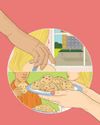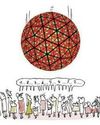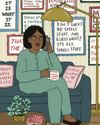Humor activates our brains and enhances our well-being perhaps more than anything else

BY DAY, ORI AMIR is a mild-mannered 30-something college professor. He teaches undergraduate psychology and neuroscience classes, conducts research into how the brain functions, and holds regular office hours on the leafy campus of Pomona College in Southern California. But his students aren’t fooled. They’ve seen the YouTube videos, the ones that document his not-so-secret other life. In one of them, Amir is gripping a microphone and standing center stage at the 1,400-seat Alex Theater in Glendale, California, wearing a striped rugby shirt, faded blue jeans, battered construction boots—and a ridiculously shaggy white fur coat. It’s the second night of the Glendale Laughs Comedy Festival, and Amir is grinning broadly at the audience through his ample beard, looking like a crazed six-foot-two redheaded Fozzie Bear.
“As you can tell by my accent, I’m a neuroscientist,” says Amir, who grew up in Israel. “They tell the professors at the university where I work to dress ‘business casual.’ This is pretty much the best I can do. My wardrobe ranges from very casual to inappropriate.” Tonight, he’s wearing the full spectrum.
Amir likes to tell his audiences— and occasionally his students—that his dream is to become a “professional comedian and an amateur neurosurgeon.” (“That way I could cut up brains for fun!”) In fact, he has already managed to combine these seemingly unrelated passions. Amir is one of the leading researchers studying the way the brain creates and understands humor. Unless you happen tobe a neuroscientist who moonlights as a stand-up, that specialty might seem trivial compared with other fields of cognition.
But the question of why we find things funny has fascinated philosophers for centuries.
Diese Geschichte stammt aus der September 2019-Ausgabe von Reader's Digest US.
Starten Sie Ihre 7-tägige kostenlose Testversion von Magzter GOLD, um auf Tausende kuratierte Premium-Storys sowie über 8.000 Zeitschriften und Zeitungen zuzugreifen.
Bereits Abonnent ? Anmelden
Diese Geschichte stammt aus der September 2019-Ausgabe von Reader's Digest US.
Starten Sie Ihre 7-tägige kostenlose Testversion von Magzter GOLD, um auf Tausende kuratierte Premium-Storys sowie über 8.000 Zeitschriften und Zeitungen zuzugreifen.
Bereits Abonnent? Anmelden

Cookies for Forgiveness
My blowup was half-baked. The apology wasn't

Puff the Magic Pastry
It always rises to the occasion

New Year's Traditions Around the World
1 MOST OF US spend the final seconds of each calendar year watching a nearly 12,000-pound geodesic sphere descend over Times Square in New York City.

Mom's Wall-Sign Wisdom
She never met a plaque or bumper sticker she didn't quote

Protect Your 'Holiday Heart'
This joyful time of year can also be dangerously stressful

Heroes of the Holidays
It's not just Santa Claus bringing the holiday magic this season. As you'll see, he's got elves all over.

The Man Who Looks After His Wife's Ex
For him and his bride, \"in sickness and in health\" meant something really special

How Risky Are Those Holiday Cocktails, Really?
The latest recommendations about drinking and your health

HOW ONE KENTUCKY TOWN SAVED ITSELF
Downtown Hazard had lost its small-town mojo to drugs. Former addicts are helping to bring it back.

Dream It, Do It, Done!
Your bucket-list goals, accomplished